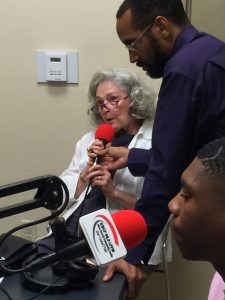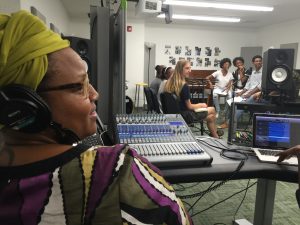calsfoundation@cals.org
Volunteers Educating Students, Teachers, and the Community

Since becoming acquainted with the Butler Center two years ago, Kwami Abdul-Bey and Clarice Abdul-Bey have been exceptional volunteer partners. The Abdul-Beys are founders and co-directors of the nonprofit the Washitaw Foothills Youth Media Arts and Literacy Collective (find more information here). Notwithstanding their quiet demeanors, the couple’s work with students and teachers in the Butler Center’s education outreach activities has been heard far and wide, literally.
Their volunteer efforts with students in the Central High Memory Project Team, a project sponsored by the Butler Center, have generated a program on National Public Radio, a real-time historical reenactment via Twitter-feed, a dozen student-led civil rights oral history interviews, and a soon-to-launch student-produced podcast series that will be an ongoing part of the Elizabeth Eckford Commemorative Bench Project in connection with the Central High National Historic Site.
The Abdul-Beys are professional audio engineers, broadcast radio programmers, and audio podcast producers—with versatile and eclectic backgrounds and skills in documentary photography, visual art, spoken-word poetry, solutions-based journalism, youth media arts programs, and community organizing. The husband-and-wife team combines this professional expertise with a keen interest in Arkansas’s social justice history and a focus on training and mentoring young people to become a voice in their community.
The couple was introduced to the Butler Center in the spring of 2017 by Sarah Stricklin, then youth programmer and media specialist at the CALS Hillary Rodham Clinton Children’s Library and Learning Center. The Abdul-Beys suggested that students in the Memory Project team could combine energies with summer high school interns in the youth radio journalism internship they were directing at the City of Little Rock’s new low-power FM community radio station, KWCP LPFM 98.9. Kwami had designed and installed the KWCP’s recording studio and transmitting station, and Clarice was training the student interns to deepen their on-air personalities with solutions-based journalism approaches to their background research and live interviews on community topics.

Under their tutelage, the KWCP interns and Memory Project students recorded programs to be used with the approaching “Central High at 60” events, including two interviews with white classmates of the Little Rock Nine in the 1957–58 school year. One was with Robin Woods Loucks, who shared algebra class with Terrence Roberts. A second was with Penny Fox, who shared biology class and lab with Gloria Ray Karlmark. (Listen to interviews by scrolling down to “Oral History” on http://www.arhistoryhub.com/student-produced-content/words-that-matter.) The KWCP interns also interviewed the Memory Project students about their newly produced audio walking tour telling the events of the failed first day attempt by the Nine to enter Central.
In another volunteer effort, the Abdul-Beys served as liaison between Butler Center and NPR’s Youth Radio to produce a special student commentary for NPR’s observance of the 60th anniversary of the Central High Crisis. To create the piece, Kwami recorded Memory Project junior Zia Tollette reflecting on her oral history interview with civil rights activist Phyllis Brown and sister of Nine member Minnijean Brown Trickey. Clarice provided the photograph package of Zia and the Memory Project team for the web upload of the radio story. The resulting piece aired on nationally on NPR’s Here and Now afternoon program on September 25, 2017.
It was the second national media posting that day. At 6 a.m., Youth Radio had launched its Twitter feed reenactment using eyewitness accounts the Memory Project students had compiled—and sent with Kwami’s technical savvy in large file transfers—from oral histories and memoirs from September 25, 1957. The feed ranked in the top 5 for interaction that day.
The Abdul-Beys have continued their volunteer efforts, helping more groups of students record and use oral history interviews in a new podcast series that will be part of the Elizabeth Eckford Commemorative Bench Project. Earlier this month, Clarice organized an interview at the Little Rock School District Superintendent’s office between Eckford and the student and adult volunteers who researched, designed, and built the historical replica of the city bus bench where she sought refuge across the street from the school over six decades ago.
The podcasts will be featured on the Arkansas History Hub website for teachers, which is maintained by Butler Center staff.
In recent months, the couple has been lending its expertise to the Butler Center’s 2019 summer seminar for Arkansas teachers: Tools for Teaching and Learning Difficult History: Racial Violence in Arkansas, the 1919 Elaine Massacre and a Century of Lynching, 1836–1936.
The Abdul-Beys are helping students and teachers from two different schools plan, conduct, and record personal interviews with families who faced lynching and other acts of racial terror. The couple will join the students and teachers to present their work in a special session at the summer seminar, along with providing copies of the interviews and guidelines others can follow to do similar projects in the coming year.
Inspired during a family trip to the newly opened National Memorial for Peace and Justice in Montgomery, Alabama, last fall, the Abdul-Beys began working with a number of historians, educators, clergy, elected representatives, and community organizations (including Guy Lancaster, editor of the CALS Encyclopedia of Arkansas, and George West, Butler Center education outreach coordinator) to form the Arkansas Peace and Justice Memorial Movement. The group has met with the Governor Asa Hutchinson and his staff and with current state legislators to seek support for a statewide effort to encourage citizen groups around Arkansas to help document and acknowledge the difficult history of racial violence.
For more information on these and other education projects, contact George West at gwest@cals.org and info@WFYMA.org.




